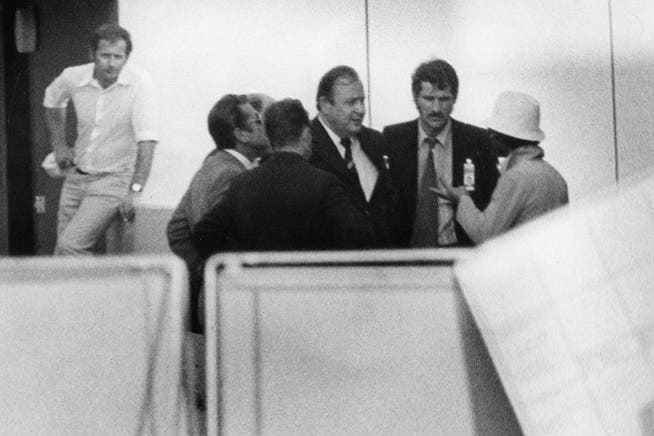Because of differences in the question of compensation, the relatives of the Israeli victims of the Olympic attack want to boycott the planned commemoration of the 50th anniversary in Munich. The dispute threatens to escalate – now the bereaved have received an invitation from London.
Ankie Spitzer in her apartment in Ramat Hasharon – for almost fifty years she has been fighting for a complete investigation into the Olympic attack in Munich – and adequate compensation for the bereaved.
On September 5, it will be 50 years since members of the “Black September” party broke into the Olympic Village in Munich and took eleven members of the Israeli delegation hostage. Two Israelis were shot dead by the Palestinian assassins right at the start of the hostage-taking after they tried to resist. The nine remaining hostages and a German policeman later died in the course of a amateurish rescue attempt at the nearby military airfield in Fürstenfeldbruck. However, three of the eight Palestinian attackers survived the hail of bullets. A few weeks later, the surviving assassins were released.
50 years later, a dispute over adequate financial compensation for the suffering suffered is still raging between the remaining relatives of the Israeli victims and the German authorities. The dispute is fought with no holds barred. Recently, the pitch has sharpened again significantly. About the New York Times Ankie Spitzer, the informal spokeswoman for the relatives, said last week that she and the other relatives would not attend the memorial service in Munich as planned out of protest.
A lot of dishes smashed
This puts the German government and the Free State of Bavaria, as organizers, in serious trouble. Because it was planned to finally draw a line under decades of quarrels on the 50th anniversary. But apparently too much crockery has been smashed in the past decades from the point of view of the bereaved. In a letter to the Bavarian Prime Minister Markus Söder, which became public over the weekend, the surviving relatives explained their rejection in sharp words.
“50 years of abuse, lies, humiliation and rejection by the German government and especially the Bavarian authorities are more than enough for us,” write Spitzer and Ilana Romano for the victims’ families. The federal government and the Free State are counting on the continuation of the negotiations. pic.twitter.com/ScYcsjypu3
— ZDF Bayern (@ZDFbayern) August 11, 2022
50 years of insults, lies, humiliation and rejection by the German and especially the Bavarian government are enough, they write. The letter reads like an outburst of anger and rage that has been building up for a long time. Mentioned, for example, is the alleged statement by the Munich police chief at the time, Manfred Schreiber, following the massacre, according to which Israel brought terror onto German soil – and not the Palestinian assassins.
Three demands
In the run-up to the 50th anniversary, the bereaved made three demands. On the one hand, they demand an apology for all the “errors, omissions and lies”, as the letter puts it. The relatives of the victims accuse Germany and Bavaria of not having adequately protected the particularly endangered delegation from Israel, despite the foreseeable danger. In fact, in 1972 there were only marginal security precautions in the Olympic village – they didn’t want to spoil the image of the “cheerful games” with armed law enforcement officers. Under no circumstances should memories of the 1936 Olympic Games in Berlin be awakened, which Hitler had misused for his propaganda.

A poorly equipped German policeman in the Olympic Village in Munich.
Finally, the bereaved described the completely unsuccessful attempt to free the hostages as a total failure. The German authorities were “too arrogant” to accept the Israeli government’s offer to send a well-trained special unit from the Mossad to Munich. The cancellation was made by Chancellor Willy Brandt and Federal Minister of the Interior Hans-Dietrich Genscher. Instead, in the night of September 6, 1972, poorly equipped German police officers with no experience in fighting terrorism were deployed during the completely unsuccessful attempt at liberation. The three surviving Palestinian bombers have also never been prosecuted. One of them probably still lives in hiding in North Africa.
The second requirement concerns the disclosure of all archives. In their letter to Prime Minister Söder, the bereaved write that it is unbelievable that some files will remain locked until 2047. “What does Germany still have to hide after five decades?” they ask polemically.
The first two demands can probably be met by the German government. Federal President Frank-Walter Steinmeier is apparently prepared to at least emphasize Germany’s joint responsibility at the planned commemoration ceremony in Munich. An expert commission made up of historians from Germany and Israel is also planned. For a comprehensive report, they should be granted access to all archives in both countries, including those of the intelligence services.

Hans-Dietrich Genscher (middle), then Federal Minister of the Interior, negotiates personally with the leader of the hostage-takers (with hat).
The sticking point is the money
The crux of the matter is the third demand, that of financial compensation for the bereaved. The German government’s failure to admit guilt has so far prevented adequate compensation for the relatives of the eleven Israeli victims. It was only through detours that money was paid out to them twice, in 1972 and 2002, both times explicitly without acknowledging any guilt.
The first payment of 1 million Deutschmarks was made through the German Red Cross. In the years that followed, the bereaved experienced many disappointments with the German authorities. Hans-Dietrich Genscher, now Foreign Minister, was on an official visit to Israel in 1976. It took Ankie Spitzer to threaten to lie down on the runway on Genscher’s return flight before he offered her a brief meeting at 6 a.m.
Born in the Netherlands, she is a journalist, her husband Andrei Spitzer was shot in Fürstenfeldbruck. For decades she demanded access to all police files, especially to the autopsy reports. It was always about the question of how the hostages had died during the unsuccessful liberation operation – by shots from the Palestinian assassins or possibly by accidental shots by German police officers. However, after the early morning meeting, Genscher informed her that the federal government had no such files.
An excerpt from a TV discussion in 1992 illustrates how little understanding those responsible had for the worries and needs of the relatives. In the Bavarian radio talk show Guests were Ankie Spitzer and Bruno Merk, who twenty years earlier, as Bavarian Minister of the Interior, shared responsibility for the debacle in Munich. Merk didn’t want to admit a single mistake during the conversation and brushed aside all of Spitzer’s objections with little sensitivity.
In another TV show marking the 20th anniversary of the Olympic assassination, Ankie Spitzer called for the missing documents to be finally released. As a result, eighty previously unknown files from an archive were passed on to her anonymously. Among them was her husband’s autopsy report. The whistleblower also stated that it was just a small excerpt from a mountain of files containing tens of thousands of documents.

Ankie Spitzer a few days after the attack in a room in the devastated accommodation.
Class action lawsuit dismissed due to statute of limitations
As a result, the relatives filed a class action lawsuit at the Munich District Court – citing serious omissions and mistakes, they demanded compensation totaling 40 million dollars from the federal government, the Bavarian state government and the city of Munich. In the first instance, the claim is rejected, mainly due to the statute of limitations. In 2004, ten years after it was filed, the class action lawsuit was scheduled to go to federal court. In the end, however, the relatives agree to an out-of-court settlement. Again without acknowledgment of guilt, they are awarded compensation of 3 million euros under the title “humanitarian gesture”. In their latest letter to Prime Minister Söder, the relatives emphasized that they needed more than two thirds of this to pay the German courts and the German (and Israeli) lawyers.
In view of the 50th anniversary of the Munich massacre, new negotiations have started through a Dutch law firm. As part of these negotiations, the federal government, the Free State of Bavaria and the city of Munich offered the 23 surviving dependents a total of 10 million euros – from which the equivalent of 4.6 million euros should be deducted that had already been paid out earlier. The reaction of the relatives to this offer was harsh. A tip is this amount, downright insulting and completely unacceptable, her spokeswoman Ankie Spitzer was quoted as saying in various media.
The fronts seem hardened. The federal government is obviously trying to find a solution. Steffen Seibert, the long-standing spokesman for German Chancellor Angela Merkel and now serving as ambassador to Israel, is at the forefront of negotiations. But those responsible have a problem: If the demands of the members of “Munich”, who demand a multiple, were to be given in, the payments to the members of the RAF terror would have to be improved as a result. In the case of the kidnapping of Hanns Martin Schleyer in autumn 1977, for example, in which four companions were killed, the compensation for the relatives was only 12,500 Deutschmarks each.
The surviving relatives of “Munich” claim that it is not German but international standards that should be applied. For example, they refer to the attack on a Pan Am plane in Lockerbie, Scotland, in which 270 people were killed in 1988. Many years later, the Libyan ruler Muammar Ghadhafi offered the victims’ relatives the horrendous sum totaling 2.5 billion dollars – almost 10 million dollars for every death.
Invitation from London
So there is still a long way to go to meet in the face of these widely differing ideas. There is not much time left if the planned commemoration in Munich is not to become an embarrassment. The British Parliament is now adding fuel to the fire: According to information from the NZZ, the Israeli survivors of the Olympic attack have been invited to a commemoration ceremony in London. Upon request, Ankie Spitzer confirmed the invitation on Monday. However, the affected families have not yet decided whether they will travel to London on September 5th.
